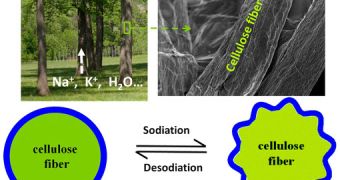Many will say that wood isn't conductive, until they remember that bit about electricity not being able to do much to trees (unless it's part of a really strong lightning strike) because the trees are grounded and release the current in the soil.
A team of researchers from the University of Maryland decided to use wood in the making of a battery.
Not just any batter, but a nanobattery that replaced the traditional stiff substrate with wood fiber, thus releasing the stress.
Wood is also used as an ion reservoir for the tin electrode.
"A sliver of wood coated with tin could make a tiny, long-lasting, efficient and environmentally friendly battery," the university claims.
The video embedded above explains how the battery works, and how the wood plays the role of the anode in a sodium-ion battery.
The new technology should be usable in everything if it takes off.

 14 DAY TRIAL //
14 DAY TRIAL //